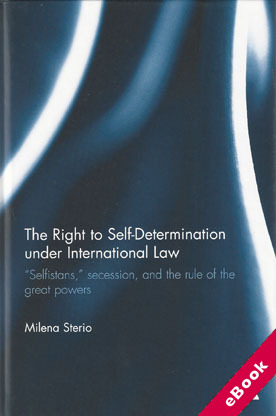
The device(s) you use to access the eBook content must be authorized with an Adobe ID before you download the product otherwise it will fail to register correctly.
For further information see https://www.wildy.com/ebook-formats
Once the order is confirmed an automated e-mail will be sent to you to allow you to download the eBook.
All eBooks are supplied firm sale and cannot be returned. If you believe there is a fault with your eBook then contact us on ebooks@wildy.com and we will help in resolving the issue. This does not affect your statutory rights.
The notion of self-determination is not novel in modern international law. It stems back to the beginning of the 20th century, when world leaders in the wake of World War I realized that national peoples, groups with a shared ethnicity, language, culture, and religion, should be allowed to self-determine their affiliation and status on the world scene.
Following on from the Second World War it became widely accepted that oppressed colonized groups ought to have similar rights to auto-regulate and to choose their political and possibly sovereign status. However, as decades passed by and as separatist minority groups throughout the world began challenging the concept of state territorial integrity, it became clear that the notion of self-determination had to be somehow confined.
This book considers the issue of self-determination in the present day where some minority groups have asserted their rights to external self-determination, only to find themselves rebuffed by the world community, while other minority groups have found strong support in the eyes of external actors and have garnered sufficient international recognition to be allowed to separate.
The book asks what is so unique about some minority groups and about their quests for independence that would justify the authorization to remedially secede? Under what circumstances does the right to external self-determination accrue? The book draws on international law as well as international relations theory to examine recent international relations issues for practical applications of self-determination quests, as well as by reviewing international legal standards that govern such independence struggles.
The book considers particular examples of attempts at self-determination including East Timor, the recent Kosovar secession from Serbia, as well as the Russian province of Chechnya and the two Georgian break-away provinces, South Ossetia and Abkhazia. This book concludes that minority groups today are able to achieve external self-determination and independence solely through the support of the most powerful states, the so-called Great Powers. Milena Sterio argues that the Great Powers' Rule seems to have morphed itself into a prevailing international relations theory, which has come to dominate the legal theories of statehood, self-determination, and secession.